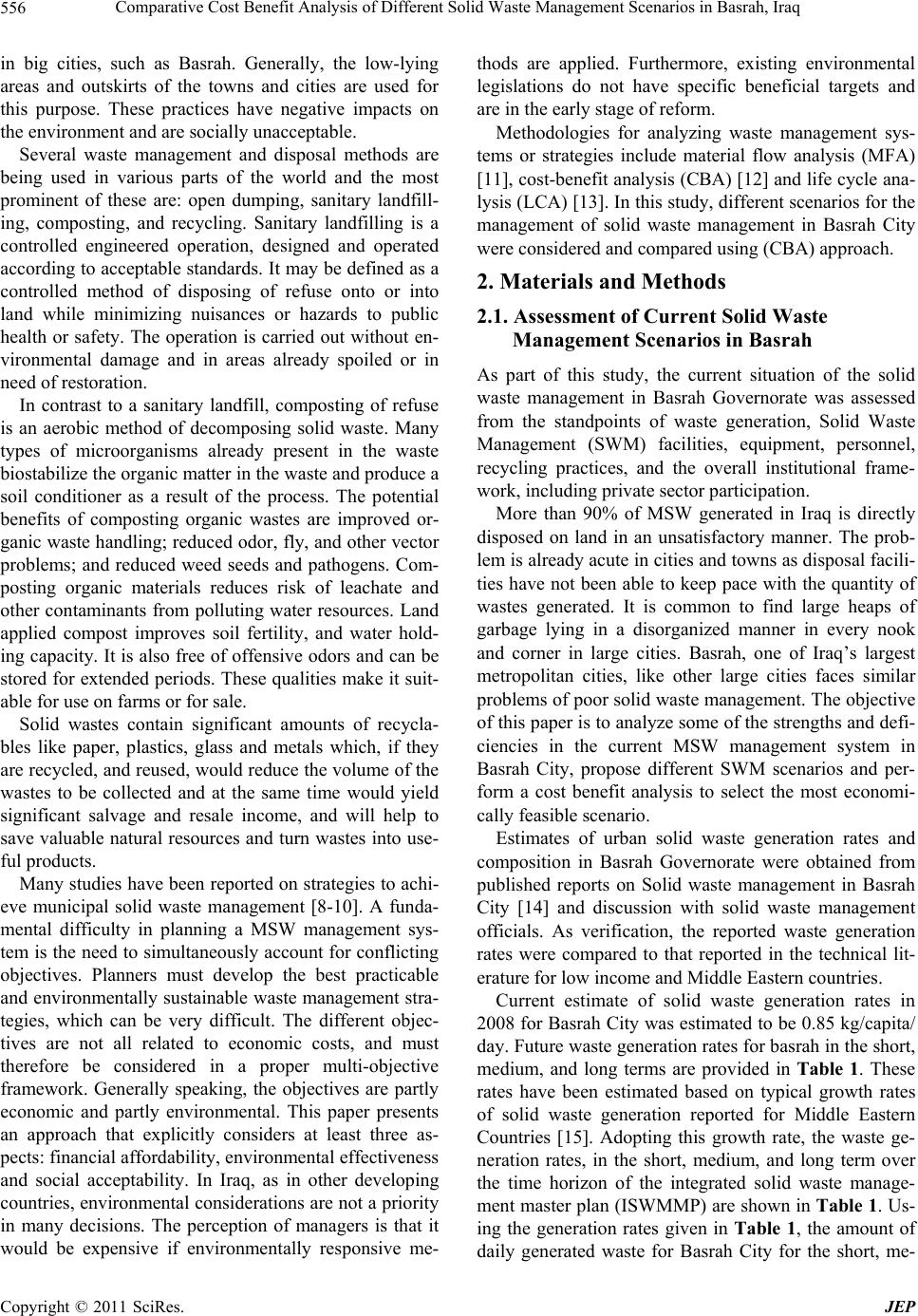
Comparative Cost Benefit Analysis of Different Solid Waste Management Scenarios in Basrah, Iraq
556
in big cities, such as Basrah. Generally, the low-lying
areas and outskirts of the towns and cities are used for
this purpose. These practices have negative impacts on
the environment and are socially unacceptable.
Several waste management and disposal methods are
being used in various parts of the world and the most
prominent of these are: open dumping, sanitary landfill-
ing, composting, and recycling. Sanitary landfilling is a
controlled engineered operation, designed and operated
according to acceptable standards. It may be defined as a
controlled method of disposing of refuse onto or into
land while minimizing nuisances or hazards to public
health or safety. The operation is carried out without en-
vironmental damage and in areas already spoiled or in
need of restoration .
In contrast to a sanitary landfill, composting of refuse
is an aerobic method of decomposing solid waste. Many
types of microorganisms already present in the waste
biostabilize the organic matter in the waste and produce a
soil conditioner as a result of the process. The potential
benefits of composting organic wastes are improved or-
ganic waste handling; reduced odor, fly, and other vector
problems; and reduced weed seeds and pathogens. Com-
posting organic materials reduces risk of leachate and
other contaminants from polluting water resources. Land
applied compost improves soil fertility, and water hold-
ing capacity. It is also free of offensive odors and can be
stored for exten ded periods. These qualities make it suit-
able for use on farms or for sale.
Solid wastes contain significant amounts of recycla-
bles like paper, plastics, glass and metals which, if they
are recycled, and reused, would reduce the volu me of the
wastes to be collected and at the same time would yield
significant salvage and resale income, and will help to
save valuable natural resources and turn wastes into use-
ful products.
Many studies have been reported on strategies to achi-
eve municipal solid waste management [8-10]. A funda-
mental difficulty in planning a MSW management sys-
tem is the need to simultaneou sly account for conflicting
objectives. Planners must develop the best practicable
and environmentally sustainable waste management stra-
tegies, which can be very difficult. The different objec-
tives are not all related to economic costs, and must
therefore be considered in a proper multi-objective
framework. Generally speaking, the objectives are partly
economic and partly environmental. This paper presents
an approach that explicitly considers at least three as-
pects: financial affordability, environmental effectiveness
and social acceptability. In Iraq, as in other developing
countries, environmental considerations are not a priority
in many decisions. The perception of managers is that it
would be expensive if environmentally responsive me-
thods are applied. Furthermore, existing environmental
legislations do not have specific beneficial targets and
are in the early stage of reform.
Methodologies for analyzing waste management sys-
tems or strategies include material flow analysis (MFA)
[11], cost-benefit analysis (CBA) [12] and life cycle ana-
lysis (LCA) [13]. In th is study, different scenar ios for the
management of solid waste management in Basrah City
were considered and compared using (CBA) approach.
2. Materials and Methods
2.1. Assessment of Current Solid Waste
Management Scenarios in Basrah
As part of this study, the current situation of the solid
waste management in Basrah Governorate was assessed
from the standpoints of waste generation, Solid Waste
Management (SWM) facilities, equipment, personnel,
recycling practices, and the overall institutional frame-
work, including private sector participation.
More than 90% of MSW generated in Iraq is directly
disposed on land in an unsatisfactory manner. The prob-
lem is already acute in cities and towns as disposal facili-
ties have not been able to keep pace with the quantity of
wastes generated. It is common to find large heaps of
garbage lying in a disorganized manner in every nook
and corner in large cities. Basrah, one of Iraq’s largest
metropolitan cities, like other large cities faces similar
problems of poor solid waste management. The objective
of this paper is to analyze some o f the strengths and de fi-
ciencies in the current MSW management system in
Basrah City, propose different SWM scenarios and per-
form a cost benefit analysis to select the most economi-
cally feasible scenario.
Estimates of urban solid waste generation rates and
composition in Basrah Governorate were obtained from
published reports on Solid waste management in Basrah
City [14] and discussion with solid waste management
officials. As verification, the reported waste generation
rates were compared to that reported in the technical lit-
erature for low income and Middle Eastern countries.
Current estimate of solid waste generation rates in
2008 for Basrah City was estimated to be 0.85 kg/cap ita/
day. Future waste generation rates for basrah in the short,
medium, and long terms are provided in Table 1. These
rates have been estimated based on typical growth rates
of solid waste generation reported for Middle Eastern
Countries [15]. Adopting this growth rate, the waste ge-
neration rates, in the short, medium, and long term over
the time horizon of the integrated solid waste manage-
ment master plan (ISWMMP) are shown in Table 1. Us-
ing the generation rates given in Table 1, the amount of
daily generated waste for Basrah City for the short, me-
C
opyright © 2011 SciRes. JEP